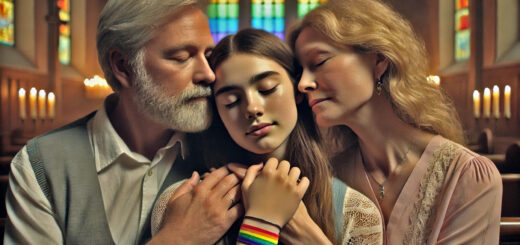Un figlio davanti a un genitore omosessuale: un nuovo percorso
Text by Alessandra Bialetti*, social pedagogist and consultant of the couple and the family of Rome, taken from his baccalaureate thesis on "Parents always. Homosexuality and parenting", Pontifical Salesian University, Faculty of Education and Salesian Education Sciences-Faculty of Education Sciences, Social Pedagogy Course, Rome, Academic Year 2012-2013, Chapter 2, paragraph 2.1
The family is a dense network of relationships in which everyone brings a experience that meets, confronts and intertwines with that of the other. Here we want to analyze the homosexual child-child relationship by not forgetting that the entire nucleus lives a profound upheaval that leads to reviewing and redesigning relational plots. For brevity, the analysis of the couple's relationship must be left out, while underlining that the cohesion and mutual support of the parents is a fundamental protective factor in the process of elaborating the new family situation.
It should be borne in mind that the homosexual parent is not an adult looking for experimentation, such as the teenager, but a person who has a life path behind, an already consolidated growth process and a responsibility towards his son and relationships to be kept, protects and make fruitful. The question that the parent arises is what his orientation can damage or disturb the growth of his child as the idea that a homosexual person can be a good parent meets many resistance.
The most recent research, especially in the US field since in Italy we speak of a still submerged reality, confirm that the children of homosexual parents are psychologically healthy and adapted and do not show a greater incidence of problems related to gender identity compared to peers who grew up in heterosexual families. The optimal development of the child seems influenced by the quality of relationships rather than the gender configuration. The presence of traumatic relationships conditions the healthy growth of the individual in terms of lack of that emotional, emotional and material support that the subject needs to grow.[1] More specifically, the development of the child's sexual identity follows the expected paths without any incidence of value regarding the orientation of the parent, as significant differences have not emerged regarding the difficulties of social and self -esteem of these subjects when they find themselves interacting in society.
The degree of stigmatization and social prejudice as a risk factor for a correct development of the person is more worrying. This, in order to fulfill themselves in a positive way, requires a favorable welcome from the reference contexts and above all of significant people such as the enlarged family circle and friendly relationships.[2]
The presence of conflicts or psychological disorders does not seem, therefore, depend on the parent's sexual orientation but on other situations at risk, such as separations and divorces, poorly elaborate and poorly managed within the family unit. Even the argument of the imitation of the sexual model proposed by the parent seems not to find its scientific validity since, in any case, the child is hardly to live isolated from the rest of the world and in close symbiosis with his father and mother so much so that he is exposed to a single context of reference.[3]
Further research have highlighted the unreliability of the inadequacy of the motherhood of the lesbian mother: it is not possible to classify the goodness of motherhood based on sexual preferences since each mother is different from another for social and ethnic extraction, for the possession of certain values and for personal preparation.[4]
It is clear how then the homosexual child-child relationship is played on the level of the relationship that is able to build over time from the first moments of life regardless of a sexual orientation which, if well integrated into the person, does not constitute a negative predictive factor of bad growth. In principle, the difficulties of the daily lives of children raised with a homosexual parent do not seem to differ from the normal evolutionary tasks typical of age. In addition, the educational-affective resources appear satisfactory both in terms of quality and quantity to face the normal and inevitable uncertainties that occur in comparison with the social world.[5]
Often, unfortunately, it is the non -acceptance of self that undermines the relationship with the child: a high degree of internalized homophobia means that the external social prejudice is introjected by the parent with a consequent sense of unworthiness to be a good guide for the child. The homosexual ends up becoming a supporter and advocate of a boycotor and negative thought on its parental capacity by realizing a sort of self -vital prophecy that does not allow a good parental relationship.[6]
To reach the coming out and establish a positive relationship with the child, two conditions are needed. The first is that the parent has already positively concluded the self-acceptance path by developing its homosexuality, the second is that it manages to speak positively. Thus the very delicate theme of secrecy is introduced. Generally parents tend to consider the risks of social visibility more than those of clandestinity also communicative. Silence does not silence what is there but the charge of interpretations, suffering and ailments.
The secrecy of the parent has a negative impact on the entire family context and even more on the children who, once they arrive at the truth, often reproach the parents of the lack of transparency on issues that profoundly involve them. Secrets and lies produce harmful effects because they let it presuppose and fear that there is something wrong, to be feared and to be afraid, something that, for its negativity, cannot be appointed and revealed. The children reproach parents to not sincerity which is something that the parent himself asks as an educational line. Only transparency, consistency and integrity creates that relationship of trust necessary for a good growth of the individual and for the possibility of relying on a guide that is perceived authentic. From interviews conducted on children of homosexual parents, it appears that the desire for clarity is the basis of a positive acceptance of the new orientation.
The confirmation, often behind pressing questions of the son himself, peaceful the spirits and opens the way to a more authentic relationship and an accrescribed esteem for the parent to have been able to face the situation and have been visible and understandable emotionally within the family unit.[7] Il rischio piuttosto ricorrente è che il figlio venga a conoscere la realtà per altre vie o semplicemente perché intuisce un clima familiare di disagio. I suoi fantasmi interiori diventano sempre più reali senza tuttavia avere l’appoggio e gli strumenti per decodificare ciò che sente, pensa, prova e di cui ha paura. L’anonimato uccide le relazioni, crea legami disturbati e getta tutta la famiglia nell’isolamento e nella solitudine. Non è bene per la crescita di un figlio percepire la non verità del genitore. In genere i figli, dopo il coming out dei genitori risultano più disturbati e in difficoltà per il mantenimento di una segretezza che per una conferma che porta alla luce dubbi, paure e timori di cui finalmente si può parlare e che si possono insieme affrontare.[8]
Appointing homosexuality, preparing the soil with good communication and a dialoguing attitude, is a way not to feed the negative image linked to the parent's identity. The maintenance of the secret, in the long run, exposes to the risk of living in an unspoken that undermines the educational path. The step of frankness requires, in any case, a preparatory work that involves both parents and calls to touch and communicative consistency. Frankness must be calibrated in relation to the age and sensitivity of the child. It is important for the parent to know how to seize the opportunities of opening and curiosity that should never be suppressed but allowed. Erlude or avoid questions or give false or ambiguous answers feeds even more that sense of shame and hiding that the parent would like to avoid.[9] Simple and sincere explanations help to correct false perceptions or distorted fantasies in the child and in the adolescent who feels the society expressing himself in a denigration way about homosexuality. The parent is called to encourage the feeling that each person is a being in himself and that everyone has his own path of life as he himself will choose his own in respect of the differences of each.
At the time of revelation, a first phase of refusal can be completely normal. Each change, especially if of considerable flow, crosses a phase of difficulty and a sense of loss compared to how the parent was imagined and lived. The son can protest, get angry and refuse but then usually arrive at acceptance as long as they are recognized and contained his emotions giving him the right space to be acted. It would therefore be essential to offer the homosexual parent and the spouse a valid support, to allow the elaboration of conflicts and inconveniences avoiding to pour and project them on the children.[10]
However, the coming out with the children must take place in a phase of growth and acquisition of sufficiently advanced awareness that leads to a management of the balanced and proactive emotional experience. The good to be safeguarded is always the harmonious and positive development of each member of the family unit taking into account that the child's interest is to develop an attachment to parents involved, competent and capable of care beyond prejudices with respect to sexual orientation. The good of the child, also and above all following a painful and difficult identity path of the parent, is to be able to count on conscientious adults and capable of providing care and a quality of relationships that guarantee the possibility of loving and being loved.[11]
________
[1] See V. Lingiardi, Citizen Gay. Families, denied rights and mental health, p. 101.
[2] See V. Lingiardi, Citizen Gay. Families, denied rights and mental health, p. 116.
[3] See A. Di Luoffo, Education to respect homosexuality, p. 146.
[4] Cf. Ibidem, p. 141.
[5] See C. Cavina - D. Danna (edited by), Grow in homogenitoric families, p. 63.
[6] See S. Manzani, Children of the same sex, Ravenna, Fernandel, 2011, p. 64.
[7] See Rainbow parents network, The voice of a daughter, in
[8] See Rainbow parents network, LGBT parenting with children from previous heterosexual relationships. From coming out to children to separation, to the relationship with the former partner, in
[9] See D. Ciriello, Homosexual and secret parents. Some good reasons to get out and organize a support network, in <http://www.gentoriRainbow.it/catterory/psicology-1>, of 5/11/2011, p. 1.
[10] See D. Ciriello, Homosexual and secret parents. Some good reasons to get out in the open and orga-noise a support network, p. 1.
[11] See V. Lingiardi, Citizen Gay. Families, denied rights and mental health, p. 103.
* Alessandra Bialetti, lives and operates in Rome as a social pedagogist and couple and family consultant in various projects from different associations and secular and Catholic realities. His website is https://alessandrabialetti.wordpress.com






